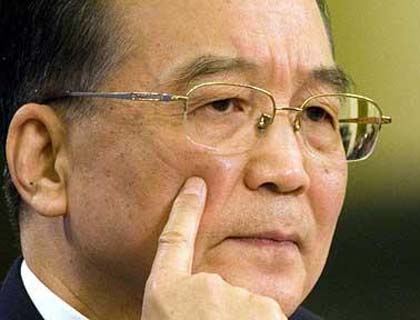LONDON – Military action alone won't resolve the Libyan crisis, Chinese Premier Wen Jiabao said Monday in a warning to nations conducting the NATO-led air campaign in Libya. Following talks in London with British Prime Minister David Cameron, the Chinese leader said his nation backed attempts to reach a political solution over Western calls for Libyan leader Moammar Gadhafi to step down after 42 years in power.
"Foreign troops may be able to win war in a place, but they can hardly win peace. Hard lessons have been learned from what has happened in the Middle East and Afghanistan," Wen told reporters at a news conference with Cameron.
He said China still supported the U.N. Security Council resolution that authorized air strikes against Libya to protect civilians, but insisted the nations involved must comply with the strict terms. Russia has accused Britain, France and other NATO participants of going beyond the scope of the resolution.
"We hope that the issue of Libya will be resolved through political, peaceful means, to reduce the humanitarian harm and in particular the harm of innocent civilians," Wen said. He said China has had recent contacts with both Gadhafi's regime and the main opposition leadership based in eastern Libya. Wen, who was wrapping up a three-day visit to Britain, took a swipe at "finger-pointing" Western critics who insist the U.K. and other nations should not pursue increased trade with China until the Asian powerhouse improves its human rights record.
Cameron said he had raised the issue during talks and that no topic had been off limits. "There is no trade-off in our relationship. It is not about either discussing trade or human rights," he said. In its latest annual report on global human rights, Britain expressed concern over the plight of Nobel Peace Prize recipient Liu Xiaobo and the detention and prosecution of other political activists.
"On human rights, China and the U.K. should respect each other, respect the facts, treat each other as equals, engage in more cooperation than finger-pointing and resolve our differences through dialogue," Wen said.
"China is not only pursuing economic development but also political structural reform and improvement in democracy and the rule of law," he said. In an afternoon speech to Britain's Royal Society, a scientific academy, Wen said he recognized the need for an academic environment "which encourages innovation, criticism and risk-taking." "Tomorrow's China will be a country that fully achieves democracy, the rule of law, fairness and justice," Wen said, promising the nation would create the "conditions for people to oversee and criticize the government."
Britain and China sealed trade deals worth 1.4 billion pounds ($2.3 billion) during the talks between senior ministers. China also offered to send two panda bears to Edinburgh Zoo in Scotland.
The two nations are aiming to quickly increase the value of their trade, and discussed opportunities for British companies in rapidly expanding regional cities outside Beijing. (AP)

